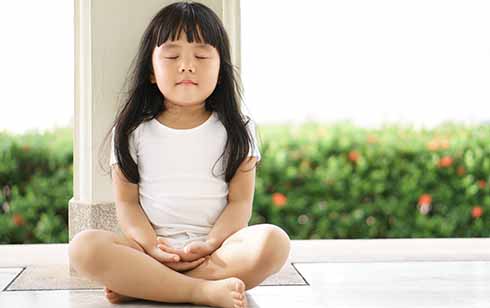 Penny Sturrock says children take to meditation much more naturally than adults. We talk to her about her work in schools across Australia.
Penny Sturrock says children take to meditation much more naturally than adults. We talk to her about her work in schools across Australia.
Penny Sturrock believes a word spoken by early Christians can help change the lives of children more than please and thank you.
The word is maranatha, an Aramaic word meaning, ‘Come, Lord’. It appears once in the Bible – in the first letter of St Paul to the Corinthians – and is the mantra for a growing number of people who practise Christian meditation, including Penny. She stumbled across meditation during a time of crisis – a close friend and mother of four died.
‘I was searching for meaning – what does the death of a young mother mean?’ Penny says.
Maranatha
She found her answer while meditating on the word maranatha at a parish meditation group.
‘I just realised I had known this from when I was a child and I sat on the knee of a nun and she just prayed’, Penny says.
Penny now has the privileged role of teaching children how to meditate through the Australian branch of the World Community for Christian Meditation.
The community’s mission is to share the spiritual fruits of meditation in a Christian tradition, as passed on to their founder, the late Fr John Main, who developed a way of praying with a mantra from his experience with an Indian spiritual guru and through studying the writings of St John Cassian.
Christian meditation
Fr John’s vision of the community is now under the leadership of Benedictine Father Laurence Freeman, and both are considered modern experts in Christian meditation.
Around the world, the community organises weekly mediation groups, retreats, annual seminars, and provides access to thousands of different resources for people wanting to learn more about this form of prayer. But their primary focus is on meditating.
Penny explains that meditation is not a relaxation technique, and is fundamentally different to the popular practice of mindfulness, though the benefits are similar.
‘Mindfulness is a very valuable secular practice and in fact Fr Laurence says mindfulness takes us to the doorway but meditation takes us within’, Penny says.
‘For Christians, to use a practice which places some emphasis on your body, paying attention on your body, is a great way to start, but we want to take the attention off ourself and place the attention, where we do with prayer, on the Mystery.’
And it’s young people, especially children, who can teach adults how to do this best.
Level praying field
‘I call children the level praying field – no one’s better at it, no one’s quicker’, Penny says.
‘The practice of Christian meditation is in fact a return to childlikeness. It is just that return to simplicity because meditation uncomplicates and takes us back to a way of being that is.’
Because of this, Penny’s approach to teaching children meditation is also uncomplicated. While her community offers ample resources to teach meditation, she doesn’t believe children need lectures, videos, or classes to meditate well. She simply sits with the children and prays.
‘This is a tradition that is passed on orally’, Penny explains. ‘The human resource is the most important thing. You need to tell them how to do it and in our community it is prayer without words, thoughts and images. You say, “We sit still, we close our eyes, and we say our prayer word, maranatha”. Children as young as two can say it.’
She also encourages teachers to approach meditation in the classroom with the same simplicity, and says that meditation is not an activity that requires evaluation.
‘For teachers, not to evaluate and not to judge and not to give stars, this is the biggest hurdle’, Penny says. ‘A little boy in Canada said, “We meditate, and then we do maths” – you do it and you get up and do the next thing.
No KPIs
‘Let go of key performance indicators (KPIs) and the way we do things and sit with the children and give them the opportunity. Then don’t ask them about how it went. Meditate, then do maths.’
Principals and teachers who have reached out to WCCM Australia
are seeing the fruits of Christian meditation too.
‘Something changes in the playground, in the school. After meditation, a child will say, “I feel a bit kinder”, or “that person isn’t so annoying”.
‘We’re not out to change the world but hopefully the world can change in one generation if we can get every nine year old to change; that’s what the Dalai Lama said.’
And the children Penny wants to see changing the most? Her 10-going-on-11 grandchildren.
‘If that’s the last thing my grand-children ever see of me - sitting still, praying – I’m happy’, Penny says.